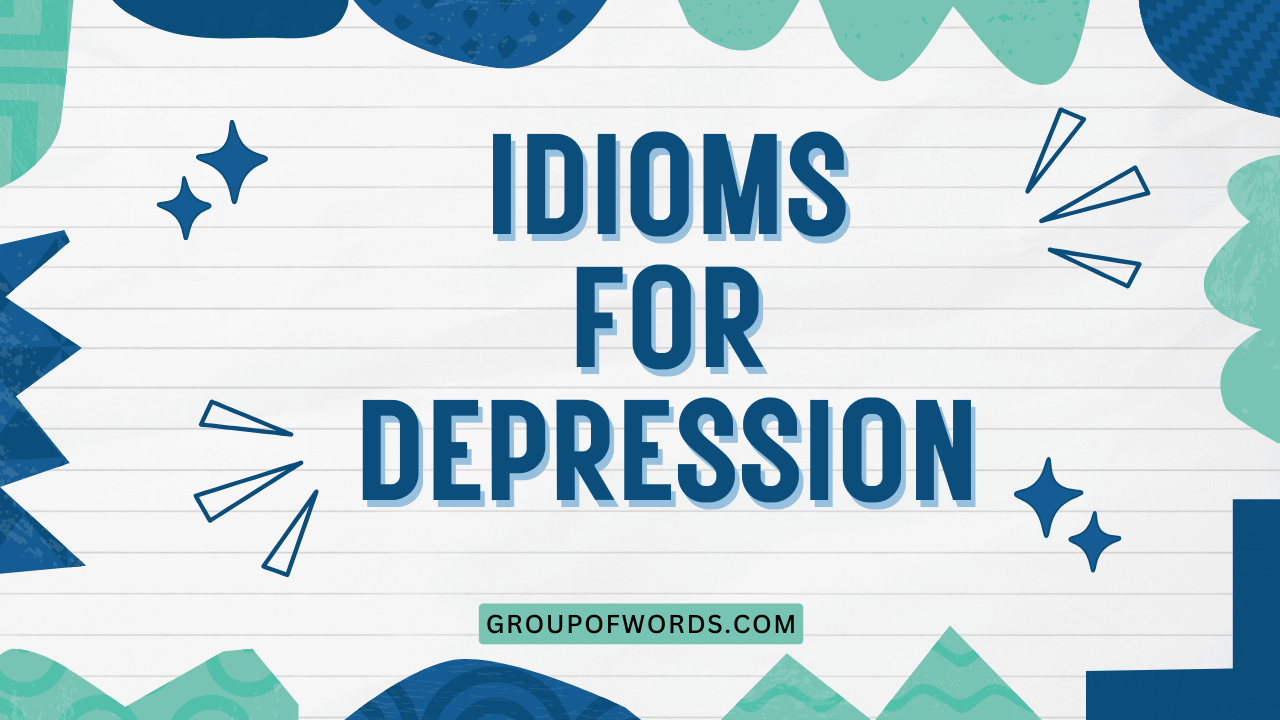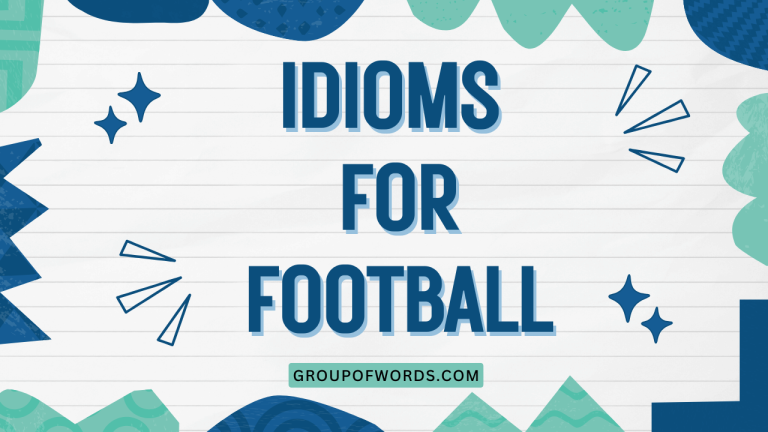Idioms for Depression: Understanding and Using Figurative Language
Understanding and using idioms is crucial for mastering English, especially when discussing sensitive topics like depression. Idioms add color and depth to our language, allowing us to express complex emotions and experiences in a relatable way.
This article provides a comprehensive guide to idioms related to depression, helping you understand their meanings, usage, and nuances. Whether you’re an English language learner, a mental health professional, or simply someone interested in expanding your vocabulary, this guide will equip you with the knowledge and skills to navigate conversations about depression with greater confidence and sensitivity.
This article will explore various idioms related to depression, providing clear definitions, examples, and practical exercises to help you incorporate them into your everyday language. By understanding these idioms, you’ll be better equipped to express your own feelings and understand those of others, fostering more meaningful and empathetic communication.
Table of Contents
- Introduction
- Definition of Idioms for Depression
- Structural Breakdown of Idioms
- Types and Categories of Idioms for Depression
- Examples of Idioms for Depression
- Usage Rules for Idioms
- Common Mistakes with Idioms
- Practice Exercises
- Advanced Topics: Nuances and Context
- Frequently Asked Questions
- Conclusion
Definition of Idioms for Depression
An idiom is a phrase or expression whose meaning cannot be understood from the literal meanings of the individual words. Instead, it conveys a figurative meaning that is culturally specific.
Idioms related to depression are used to describe feelings of sadness, hopelessness, and despair in a more vivid and relatable manner. These idioms often draw on metaphors and analogies to convey the weight and complexity of depressive experiences.
These idioms can be classified based on their underlying metaphors, such as those related to weather (e.g., “under the weather”), weight (e.g., “weighing someone down”), or darkness (e.g., “a dark cloud”). Understanding these classifications can help you grasp the nuances of each idiom and use them appropriately.
The function of idioms for depression is to provide a more accessible and nuanced way to discuss a sensitive topic. They allow speakers to express their feelings without necessarily using clinical or overly direct language, which can sometimes be off-putting or stigmatizing.
In contexts such as casual conversations, literature, and even therapeutic settings, idioms can serve as a bridge to understanding and empathy.
Structural Breakdown of Idioms
Idioms, while seemingly simple, possess unique structural characteristics. They often involve a combination of nouns, verbs, adjectives, and prepositions that, when combined, create a meaning distinct from their individual components.
Understanding these structural patterns can aid in recognizing and interpreting idioms effectively.
Many idioms follow a subject-verb-object (SVO) structure or incorporate prepositional phrases. For example, in the idiom “feeling blue,” “feeling” is the verb and “blue” functions as an adjective describing the subject’s state.
Similarly, “down in the dumps” uses a prepositional phrase to indicate a state of low spirits. Recognizing these common structures can help you identify unfamiliar idioms and infer their meanings from context.
The rules governing idioms are not always straightforward. Idioms often defy standard grammatical rules, making them challenging for non-native speakers.
For instance, the phrase “kick the bucket” doesn’t literally involve kicking anything; its meaning is entirely figurative. Therefore, understanding idioms requires a different approach than analyzing literal language.
Types and Categories of Idioms for Depression
Idioms for depression can be categorized based on the specific aspect of the emotional experience they describe. These categories include idioms related to sadness, hopelessness, isolation, and lack of motivation.
By understanding these categories, you can better choose the appropriate idiom to express a particular feeling or situation.
Idioms Related to Sadness
These idioms describe the feeling of being unhappy or sorrowful. They often use metaphors of color, weather, or physical discomfort to convey the experience of sadness.
Idioms Related to Hopelessness
These idioms express a sense of despair and a lack of optimism about the future. They often involve metaphors of darkness, entrapment, or futility.
Idioms Related to Isolation
These idioms describe the feeling of being alone or disconnected from others. They often use metaphors of separation, distance, or exclusion.
Idioms Related to Lack of Motivation
These idioms express a lack of energy, enthusiasm, or desire to engage in activities. They often involve metaphors of weight, paralysis, or exhaustion.
Examples of Idioms for Depression
The following tables provide extensive examples of idioms related to depression, organized by category. Each table includes the idiom, its meaning, and example sentences to illustrate its usage.
These examples will help you understand the context in which each idiom is typically used and how to incorporate it into your own language.
Table 1: Idioms Related to Sadness
This table provides examples of idioms that express feelings of sadness or unhappiness. Each idiom is accompanied by its meaning and example sentences to illustrate its usage.
| Idiom | Meaning | Example Sentence |
|---|---|---|
| Feeling blue | Feeling sad or depressed | She’s been feeling blue ever since she lost her job. |
| Down in the dumps | Feeling unhappy or depressed | He’s been down in the dumps since his girlfriend broke up with him. |
| Have a long face | To look sad or unhappy | She had a long face after failing the exam. |
| A heavy heart | Feeling sad or burdened by sorrow | He left with a heavy heart, knowing he might never see her again. |
| Tears welling up | About to cry | Her tears were welling up as she listened to the sad story. |
| Inconsolable | Unable to be comforted | After the loss of her pet, she was inconsolable. |
| Bawling one’s eyes out | Crying very loudly and uncontrollably | She was bawling her eyes out after receiving the bad news. |
| A lump in one’s throat | A tight feeling in the throat caused by sadness | He had a lump in his throat as he said goodbye. |
| To be crestfallen | To be disappointed and dejected | He was crestfallen when he didn’t get the promotion. |
| To be heartbroken | To be extremely sad or emotionally wounded | She was heartbroken after their relationship ended. |
| To be in the doldrums | To be in a state of inactivity or stagnation, often accompanied by low spirits | The company has been in the doldrums since the recession began. |
| To have the blues | To feel sad or depressed, often without a specific reason | I often have the blues during the winter months. |
| To feel low | To feel depressed or lacking in energy | She’s been feeling low since her grandfather passed away. |
| To wear one’s heart on one’s sleeve | To openly display one’s emotions, especially sadness or vulnerability | He always wears his heart on his sleeve, so it’s easy to tell when he’s upset. |
| Down in the mouth | Looking depressed or unhappy | He looked a bit down in the mouth after the game. |
| A shadow of one’s former self | To be much weaker or unhappier than before | Since his illness, he’s just a shadow of his former self. |
| Mourning | Feeling or expressing sorrow or grief | She is still mourning the loss of her brother. |
| Grief-stricken | Deeply affected by grief | The family was grief-stricken after the accident. |
| A melancholic mood | A feeling of pensive sadness, typically with no obvious cause | She was in a melancholic mood after watching the old movie. |
| Wallowing in sorrow | Indulging in feelings of grief or sadness | He spent weeks wallowing in sorrow after the breakup. |
| Lost in grief | Completely consumed by sorrow | She was utterly lost in grief after the funeral. |
| Shedding tears | Crying | She was shedding tears as she read the letter. |
| On the verge of tears | About to cry | She was on the verge of tears when she heard the news. |
| To have a cry | To weep or sob | Sometimes, it helps to have a cry when you’re feeling overwhelmed. |
| To be in floods of tears | To be crying uncontrollably | She was in floods of tears after the argument. |
| To drown one’s sorrows | To try to forget one’s troubles by drinking alcohol | He tried to drown his sorrows after losing his job. |
| A sorrowful heart | A heart filled with sorrow | She carried a sorrowful heart after the tragedy. |
| To be full of woe | To be filled with deep sorrow or grief | She was full of woe after the death of her friend. |
Table 2: Idioms Related to Hopelessness
This table presents idioms that describe feelings of hopelessness and despair. These idioms often use metaphors of darkness or entrapment to convey the sense of being trapped in a negative state.
| Idiom | Meaning | Example Sentence |
|---|---|---|
| See no light at the end of the tunnel | To believe that a difficult situation will never improve | He sees no light at the end of the tunnel after so many failed attempts. |
| Give up hope | To lose all hope | She gave up hope of ever finding her lost dog. |
| At wit’s end | Not knowing what to do to solve a problem | I’m at my wit’s end trying to figure out how to fix this. |
| A lost cause | A situation or person with no hope of success or improvement | Trying to convince him to change his mind is a lost cause. |
| A dead end | A situation with no possibility of progress | The investigation reached a dead end. |
| In despair | In a state of hopelessness | He was in despair after losing everything. |
| On the brink of despair | Close to losing all hope | She was on the brink of despair when she received the good news. |
| A sense of futility | A feeling that one’s efforts are useless or ineffective | He was overcome with a sense of futility. |
| To feel defeated | To feel like one has lost or failed | She felt defeated after the setback. |
| To be in a dark place | To be in a state of emotional distress or depression | He admitted he had been in a dark place for several months. |
| To lose heart | To lose courage or enthusiasm | Don’t lose heart; keep trying. |
| To be downcast | To be discouraged or disheartened | She was downcast after receiving the rejection letter. |
| To be in the depths of despair | To be in a very low state of hopelessness | He was in the depths of despair after the tragedy. |
| To be devoid of hope | To have no hope at all | She felt devoid of hope after the failure. |
| To see a bleak future | To anticipate a hopeless or unfavorable future | He sees a bleak future for the company. |
| To feel trapped | To feel unable to escape a difficult situation | She felt trapped in her unhappy marriage. |
| To feel helpless | To feel unable to do anything to improve a situation | He felt helpless watching his friend struggle. |
| To be at the end of one’s rope | To have no more patience or energy to deal with a difficult situation | She was at the end of her rope dealing with the constant stress. |
| To hit rock bottom | To reach the lowest possible point in one’s life | He hit rock bottom when he lost his job and his house. |
| To lose faith | To lose trust or belief in something or someone | She lost faith in the system after the injustice. |
| To be resigned to fate | To accept an undesirable situation because it cannot be changed | He was resigned to fate after the diagnosis. |
| To be in a hopeless situation | To be in a situation with no chance of improvement | They were in a hopeless situation after the disaster. |
| To give in to despair | To surrender to feelings of hopelessness | She refused to give in to despair despite the challenges. |
| To be without hope | To have no hope | She felt without hope after the series of setbacks. |
| To be in a state of despondency | To be in a state of low spirits caused by loss of hope or courage | He was in a state of despondency after the failure of his project. |
| To be overcome with pessimism | To be overwhelmed by a negative outlook | She was overcome with pessimism about the future. |
| To be stuck in a rut | To be in a monotonous and unchanging routine | He felt stuck in a rut at his job. |
| To feel like giving up | To feel like abandoning one’s efforts | She felt like giving up after the numerous obstacles. |
Table 3: Idioms Related to Isolation
This table provides idioms that describe feelings of isolation and loneliness. These idioms often use metaphors of distance or separation to convey the sense of being disconnected from others.
| Idiom | Meaning | Example Sentence |
|---|---|---|
| Feeling like an outsider | Feeling excluded or not belonging | She felt like an outsider at the party. |
| All alone in the world | Feeling completely isolated and without support | He felt all alone in the world after his family moved away. |
| Cut off from the world | Isolated or disconnected from society | After the storm, the village was cut off from the world. |
| A lone wolf | A person who prefers to be alone and independent | He’s always been a lone wolf, preferring his own company. |
| Living in a bubble | Isolated from reality or from the outside world | They’re living in a bubble, unaware of the problems others face. |
| Feeling detached | Feeling emotionally disconnected or distant | She was feeling detached from her friends and family. |
| To be alienated | To be estranged or isolated from a group or society | He felt alienated from his peers because of his different interests. |
| To be on the fringes | To be on the edge of a group or society, not fully accepted | They lived on the fringes of society, struggling to survive. |
| To feel left out | To feel excluded from an activity or group | She felt left out when her friends went to the concert without her. |
| To be a stranger | To be unknown or unfamiliar to others | He felt like a stranger in his own hometown. |
| To be isolated | To be separated from others | She felt isolated during the lockdown. |
| To be secluded | To be kept apart from others | He lived a secluded life in the mountains. |
| To feel like an island | To feel completely alone and disconnected | She felt like an island in the middle of the city. |
| To be adrift | To feel lost and without direction or purpose | He felt adrift after losing his job and his home. |
| To be on one’s own | To be independent and without assistance or support | She had to learn to be on her own after moving to a new city. |
| To feel disconnected | To feel a lack of connection with others | He felt disconnected from his family after the argument. |
| To be distant | To be aloof or emotionally reserved | She had become distant since the trauma. |
| To feel withdrawn | To be reserved and not wanting to communicate with others | He felt withdrawn after the incident. |
| To be out of touch | To be unaware of current events or trends | He felt out of touch with the younger generation. |
| To feel unloved | To feel that one is not cared for or appreciated | She felt unloved after the harsh criticism. |
| To be a recluse | To live in seclusion and avoid contact with people | He became a recluse after the tragedy. |
| To feel forsaken | To feel abandoned or deserted | She felt forsaken by her friends when she needed them most. |
| To be excluded | To be prevented from participating in something | He felt excluded from the group because he didn’t share their interests. |
| To feel marginalized | To be treated as insignificant or peripheral | They felt marginalized in the workplace. |
| To be on the outside looking in | To be excluded from a group or activity, observing from a distance | She felt like she was on the outside looking in, watching her friends have fun without her. |
| To be in a world of one’s own | To be preoccupied with one’s own thoughts and feelings, oblivious to the world around | He seemed to be in a world of his own, lost in his thoughts. |
| To be like a fish out of water | To feel uncomfortable or out of place in a particular situation | She felt like a fish out of water at the formal event. |
| To feel like a square peg in a round hole | To feel like one doesn’t fit in or belong | He felt like a square peg in a round hole at his new job. |
Table 4: Idioms Related to Lack of Motivation
This table includes idioms that describe a lack of motivation or energy, often associated with depression. These idioms frequently use metaphors of weight, paralysis, or exhaustion.
| Idiom | Meaning | Example Sentence |
|---|---|---|
| Feeling drained | Feeling exhausted or depleted of energy | She was feeling drained after a long day at work. |
| Lacking motivation | Not having the desire or enthusiasm to do something | He’s been lacking motivation to study for his exams. |
| Can’t be bothered | Not wanting to make the effort to do something | I can’t be bothered to cook dinner tonight. |
| Dragging one’s feet | Doing something slowly or reluctantly | He’s been dragging his feet on the project. |
| Feeling apathetic | Feeling indifferent or lacking interest | She was feeling apathetic about everything. |
| To be lethargic | To be sluggish and lacking energy | He was lethargic and unable to concentrate. |
| To be burnt out | To be exhausted from prolonged stress | She was burnt out from working too many hours. |
| To be running on empty | To be continuing to function despite being exhausted | He was running on empty after weeks of sleepless nights. |
| To be in a slump | To be in a period of poor performance or low spirits | The team was in a slump after losing several games. |
| To have no get-up-and-go | To lack energy and enthusiasm | She had no get-up-and-go after the illness. |
| To be weighed down | To be burdened by problems or responsibilities | He was weighed down by his financial troubles. |
| To feel paralyzed | To feel unable to take action | She felt paralyzed by fear. |
| To be stuck in a rut | To be in a monotonous and unchanging routine | He felt stuck in a rut at his job. |
| To lack zest for life | To lack enthusiasm and energy for life | She lacked zest for life after the tragedy. |
| To feel listless | To feel lacking in energy and enthusiasm | He felt listless and unmotivated. |
| To be sapped of energy | To have one’s energy depleted | She was sapped of energy by the constant stress. |
| To feel like a zombie | To feel lifeless and lacking emotion | He felt like a zombie after the sleepless night. |
| To be dragging oneself around | To move slowly and with great effort | She was dragging herself around because she was so exhausted. |
| To have no drive | To lack ambition and motivation | He had no drive to pursue his dreams. |
| To be uninspired | To lack creative or intellectual stimulation | She felt uninspired by her work. |
| To be indifferent | To lack interest or concern | He felt indifferent to the problems of others. |
| To be passive | To be inactive and not taking initiative | She was passive and didn’t participate in the group. |
| To be like a wet blanket | To be someone who discourages enthusiasm or enjoyment | He was like a wet blanket at the party. |
| To be in a state of inertia | To be in a state of inactivity or resistance to change | The project was in a state of inertia due to lack of leadership. |
| To be unable to focus | To have difficulty concentrating | She was unable to focus due to her anxiety. |
| To feel mentally foggy | To have difficulty thinking clearly | He felt mentally foggy after the medication. |
| To be in a fog | To be confused or disoriented | She was in a fog after the accident. |
| To lack the will to do something | To not have the determination or desire to do something | He lacked the will to do something about his situation. |
Usage Rules for Idioms
Using idioms correctly requires careful attention to context and nuance. While idioms can add color and expressiveness to your language, using them inappropriately can lead to confusion or miscommunication.
Here are some key rules to keep in mind when using idioms related to depression:
- Context is crucial: Ensure that the idiom fits the specific situation and emotional tone. For example, “feeling blue” is appropriate for expressing general sadness, while “in the depths of despair” is more suitable for describing a severe state of hopelessness.
- Know your audience: Consider your audience’s familiarity with idioms. If you’re speaking to non-native English speakers or individuals unfamiliar with figurative language, it’s best to use simpler, more direct expressions.
- Avoid overuse: While idioms can be effective, overuse can make your language sound cliché or unnatural. Use them sparingly and strategically to enhance your communication.
- Be sensitive: When discussing depression, be mindful of the potential impact of your words. Avoid using idioms that could trivialize or belittle the experience of depression.
- Consider the cultural context: Idioms can vary in meaning and usage across different cultures. Be aware of these variations and avoid using idioms that may be misunderstood or offensive in certain contexts.
Common Mistakes with Idioms
One of the most common mistakes is taking idioms literally. For example, someone might misunderstand “feeling blue” as literally turning the color blue.
Another common error is using idioms out of context, which can result in awkward or nonsensical sentences. It’s also important to avoid mixing idioms, as this can create confusion and undermine your message.
Here are some examples of common mistakes and their corrections:
| Incorrect | Correct | Explanation |
|---|---|---|
| She was literally feeling blue. | She was feeling blue. | “Feeling blue” is an idiom and should not be taken literally. |
| He’s at the end of his rope, so he climbed it. | He’s at the end of his rope. | The idiom “at the end of one’s rope” means to be at the limit of one’s endurance, not to literally climb a rope. |
| She was down in the dumps and gave up the ghost. | She was down in the dumps. / She gave up the ghost. | Mixing idioms can create confusion. It’s better to use one idiom at a time. |
| He’s seeing the light at the end of the tunnel, so he bought sunglasses. | He’s seeing the light at the end of the tunnel. | “Seeing the light at the end of the tunnel” is an idiom and should not be taken literally. |
Practice Exercises
Test your understanding of idioms for depression with these practice exercises. Choose the correct idiom to complete each sentence.
Exercise 1: Fill in the Blanks
Choose the correct idiom from the list below to complete each sentence.
- Feeling blue
- Down in the dumps
- See no light at the end of the tunnel
- Give up hope
- A lost cause
- She’s been __________ ever since she lost her job.
- He __________ of ever finding his lost dog.
- Trying to convince him to change his mind is __________.
- He __________ after so many failed attempts.
- She’s been __________ since her boyfriend broke up with her.
Answer Key:
- Feeling blue
- Gave up hope
- A lost cause
- Sees no light at the end of the tunnel
- Down in the dumps
Exercise 2: Multiple Choice
Choose the correct meaning of the idiom in each sentence.
- He has a heavy heart.
- A) He is physically ill.
- B) He is burdened by sorrow.
- C) He is very strong.
- She is at her wit’s end.
- A) She is very clever.
- B) She is not knowing what to do to solve a problem.
- C) She is angry.
- He is feeling like an outsider.
- A) He is standing outside.
- B) He is excluded or not belonging.
- C) He is feeling adventurous.
- She is running on empty.
- A) She is driving a car.
- B) She is continuing to function despite being exhausted.
- C) She is very energetic.
- He is dragging his feet.
- A) He is walking slowly.
- B) He is doing something slowly or reluctantly.
- C) He is exercising.
Answer Key:
- B) He is burdened by sorrow.
- B) She is not knowing what to do to solve a problem.
- B) He is excluded or not belonging.
- B) She is continuing to function despite being exhausted.
- B) He is doing something slowly or reluctantly.
Exercise 3: Sentence Completion
Complete each sentence with an appropriate idiom related to depression.
- After losing his job, he felt like he had __________.
- She was so sad that she __________.
- He couldn’t find any joy in life; he __________.
- Despite the challenges, she refused to __________.
- After working non-stop for months, she realized she was __________.
Answer Key (Example answers, other answers may be valid):
- After losing his job, he felt like he had hit rock bottom.
- She was so sad that she bawled her eyes out.
- He couldn’t find any joy in life; he lacked zest for life.
- Despite the challenges, she refused to give in to despair.
- After working non-stop for months, she realized she was burnt out.
Advanced Topics: Nuances and Context
For advanced learners, understanding the subtle nuances and cultural contexts of idioms is essential. Some idioms may have regional variations or carry different connotations depending on the specific cultural context.
For example, an idiom that is commonly used in American English may not be as familiar or appropriate in
British English.
Additionally, the historical origins of idioms can provide deeper insights into their meanings and usage. Researching the etymology of idioms can reveal interesting connections to historical events, social customs, and cultural beliefs.
For instance, the idiom “the blues” has roots in African American musical traditions and reflects the experience of hardship and sorrow.
Furthermore, exploring the use of idioms in literature and media can enhance your understanding of their expressive power. Analyzing how authors and filmmakers use idioms to convey emotions and create vivid imagery can provide valuable insights into the art of communication.
Consider how idioms are used in poems, novels, films, and songs to evoke feelings of sadness, hopelessness, or isolation.
Frequently Asked Questions
Why is it important to learn idioms related to depression?
Learning idioms related to depression can help you express your feelings more accurately and understand the feelings of others. They provide a nuanced way to discuss a sensitive topic and foster more empathetic communication.
Are idioms the same across different English-speaking countries?
No, idioms can vary across different English-speaking countries. Some idioms may be more common in American English, while others may be more prevalent in British English or other regional dialects.
How can I avoid misusing idioms?
To avoid misusing idioms, it’s important to understand their meanings and usage rules. Pay attention to context, consider your audience, and avoid taking idioms literally.
Practice using idioms in your own language and seek feedback from native English speakers.
Can idioms be offensive?
Yes, some idioms can be offensive, especially when discussing sensitive topics like depression. Be mindful of the potential impact of your words and avoid using idioms that could trivialize or belittle the experience of depression.
Where can I find more resources for learning idioms?
There are many resources available for learning idioms, including dictionaries, textbooks, online courses, and language exchange partners. You can also find examples of idioms in literature, media, and everyday conversations.
Conclusion
Mastering idioms for depression is a valuable skill for anyone looking to enhance their English language proficiency and communicate more effectively about emotional experiences. By understanding the meanings, usage rules, and nuances of these idioms, you can express yourself with greater clarity and sensitivity.
Whether you’re a language learner, a mental health professional, or simply someone interested in expanding your vocabulary, this guide has provided you with the tools and knowledge to navigate conversations about depression with greater confidence and empathy.
Remember that language is a powerful tool, and using it wisely can make a significant difference in how we understand and support one another. Continue to explore and practice using idioms in your everyday language, and you’ll be well on your way to becoming a more effective and compassionate communicator.






